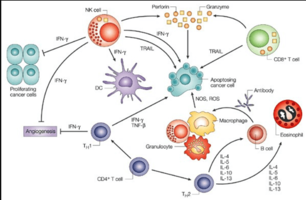New Cancer Cytokines Assay for Detection of Multiple Cytokine Levels
Press Release Summary:

- Tumor cell-derived VEGFs act on endothelial cells to promote angiogenesis and tumor growth
- Ensures stimulation of host responses thus controlling cellular stress and minimizing cellular damage
- Serves for researchers in the pharmaceutical and biotechnology industries
Original Press Release:
Creative Proteomics Cytokine Boosts Cancer Research with Cancer Cytokines Assay
Cytokine, a subdivision of Creative Proteomics, specializes in providing cytokine research and analytical services for researchers in the pharmaceutical and biotechnology industries, as well as academic institutes and government agencies. Recently, the product manager of the company was pleased to announce the launch of its Cancer Cytokines Assay, assisting in the detection of multiple cytokine levels within a single sample.
The cocktail of cytokines produced in the cancer microenvironment has important roles in cancer pathogenesis. Cytokines released during infection, inflammation, and immune responses can inhibit cancer initiation and progression. Additionally, cancer cells can be responsive to host-derived cytokines, i.e., inducing cancer cell proliferation, attenuating apoptosis, and promoting cellular invasion and metastasis, etc.
The release of cytokines is stimulated by a variety of cellular stress responses, including carcinogen-induced injury, infection, and inflammation. In these cases, the function of cytokines is to stimulate host responses thus controlling cellular stress and minimizing cellular damage. Although effective damage control can promote tissue repair, unhealed damage can lead to the continuous production of cytokines, which can aggravate tissue destruction. Thus, host responses to cellular stress can influence various stages of cancer development and progression.
Tumor cell-derived vascular endothelial growth factors (VEGFs) act on endothelial cells to promote angiogenesis and tumor growth, invasion, and metastasis. At tumor sites, monocytes differentiate into tumor-associated macrophages capable of inducing growth factors, proteases, angiogenic mediators, and cytokines such as TNFα, IL-1 and IL-6, and chemokines. Chemokines such as CXCL10 (IP-10) and CXCL9 may inhibit cancer development. In addition, adhesion molecules, such as ICAM-1, ICAM-3, VCAM-1, and selectins, are expressed by various tumor cells and are often key factors in metastatic malignancy.
“Creative Proteomics has a professional cancer cytokine detection platform—the Luminex cytokine detection platform. This Luminex platform adapted the fluorescently encoded microspheres with specific antibodies targeting different molecules. These microspheres can be combined freely to a certain extent so that up to 100 analytes can be tested simultaneously in a single experiment,” stated a senior scientist from Creative Proteomics.
“We also offer different analytic strategies, such as real-time quantitative polymerase chain reaction, ELISA and flow cytometry, to meet your unique research needs. We’ll design the most appropriate technology combination according to your project and help researchers obtain higher-quality scientific research data,” he further added.
About Creative Proteomics
Creative Proteomics is an innovative contract research organization that focuses on using advanced equipment platforms and optimized detection technologies to help researchers around the world reduce time and costs. The company has a proprietary laboratory information management system to strengthen laboratory quality monitoring and management, ensuring the efficiency and security of customer data.
Contact:
Address: Shirley, NY 11967, USA
Email: contact@creative-proteomics.com




